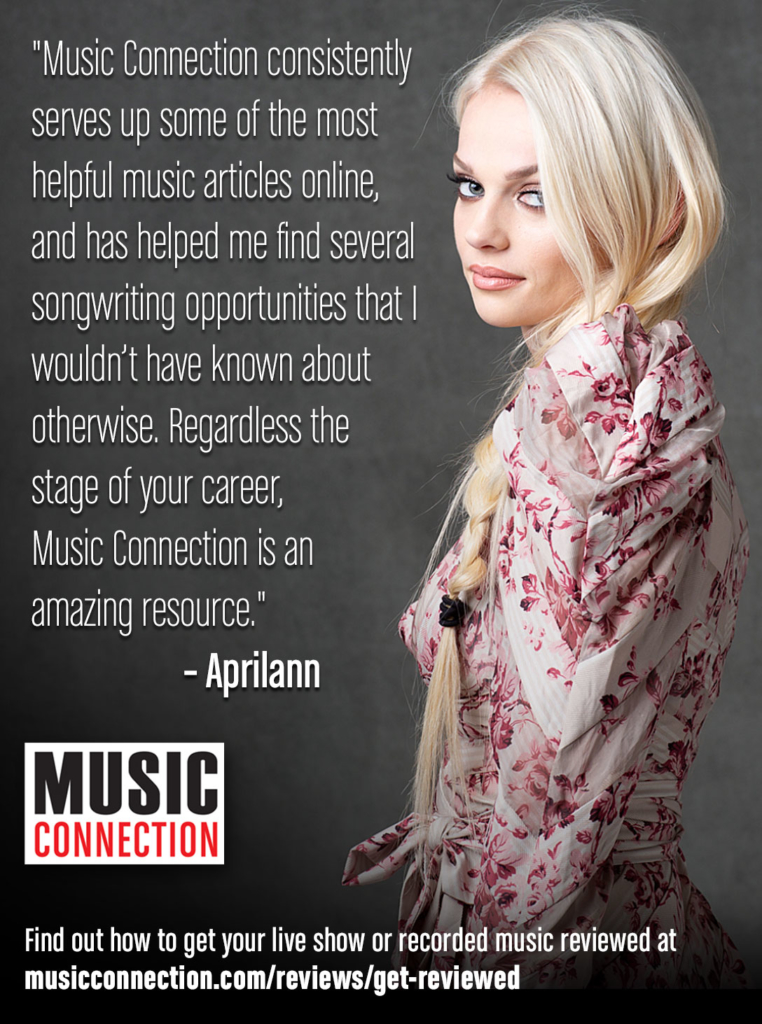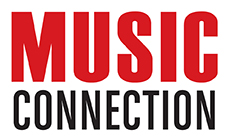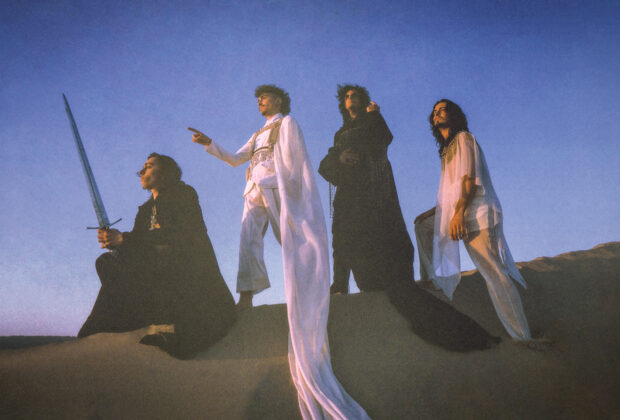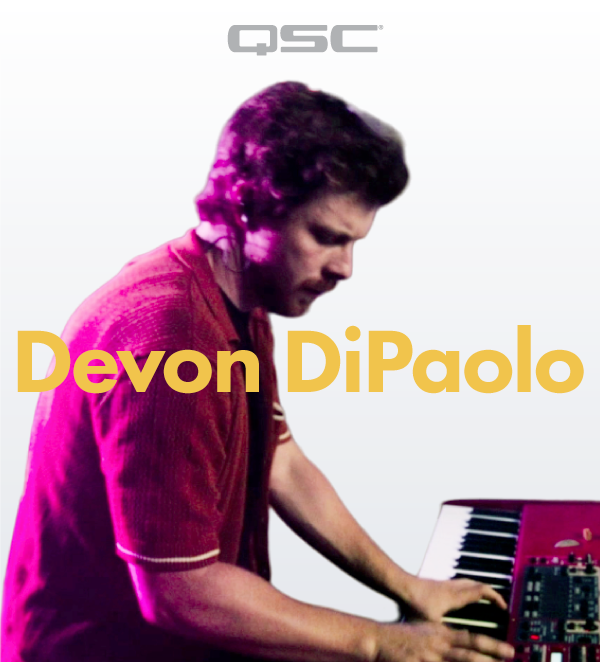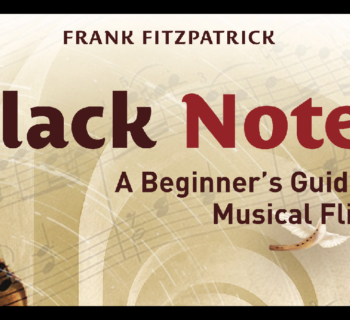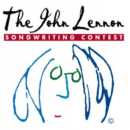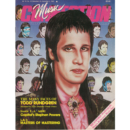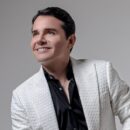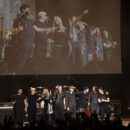From their humble Mid-Michigan beginnings, Greta Van Fleet have steadily become a mainstay on the global rock & roll landscape. From their start in 2012, brothers Josh Kiszka (lead vocals); Jake Kiszka (guitar/backup vocals); Sam Kiszka (bass/keyboards/backup vocals) created a unified style forged in classic rock that has caught the attention and favor of such luminaries as Robert Plant and Elton John. When friend and drummer-backup vocalist Danny Wagner came on board in 2013, it’s been all systems go, with a trail of multiple awards and sellout concerts in their wake. We recently sat down with the insightful Wagner to get his take on the new album and the band’s epic journey thus far.
Music Connection: As we’re doing this interview, you’re playing Washington, D.C., tonight and you just played Little Caesar’s Arena in Detroit a couple days ago. How did it feel to play for a home state crowd and see family?
Danny Wagner: It was beautiful. The entire day was completely surreal. I set my own personal record for longest amount of time with goose bumps leading up to the show. But the show was a success and we had so much fun seeing family and friends. It was so great having them all in one place.
MC: How did you all come about working with Starcatcher producer Dave Cobb?
Wagner: It was almost inevitable at some point that we’d end up doing a project with him. The story of us meeting him actually dates back to the first album we recorded, Anthem of the Peaceful Army. We were recording that in Nashville where he was recording at the time and he actually popped into the studio one day during our tracking. We were all very young and we had the chance to meet him. And at the time we knew of him because of the Rival Sons who we were all huge fans of. And the man has worked with so many incredible acts.
And then we met him a couple other times just hanging around Nashville. We were just waiting for the right moment, and he was always on our radar. But we wanted to make sure that us, the music we had and the position we were in, were equally as ready to make that leap into working with him, because we knew it would be a big leap. And over the pandemic we met him one more time and it was kind of off to the races.
We met him at RCA Studios and he had instruments set up for us to come in and jam on, just keeping the meeting organic. And we started jamming and it was like someone stuck a rock and water just flowed. It was amazing, and we quickly realized it was a fantastic fit. And three or four of those jamming moments, Dave actually took the live versions and stuck them on the album. When we went back a couple of months later, agreeing to start the album, we already had a couple of the songs underway. That’s one of his famous tricks. He captures bands at their most vulnerable and most natural states which I think is incredible.
MC: So, he wanted to catch you in more of an impromptu state, with no filters?
Wagner: Yes. The type of music we grew up listening to is just so organic and human. It’s tough to find that in yourself in such a modern-day recording setting, because everything can be bandaged up. Movie magic can be transferred to music and there’s musical magic. And there are all sorts of things you can do. So, he really captured us in our most honest state, which I thought was special. I feel this new album represents us as human beings and as writers and musicians in our most human state.
MC: I listened to a podcast recently and Jake talked about your playing and writing process. He said it was all very instinctual, so what you’re saying makes sense.
Wagner: It certainly does. And to an extent, we’ve been known to have that instinctual writing. From the very minute this band formed we were off to the races as far as the four of us collaborating and writing. It came so naturally, and that’s what started igniting the fire for us personally. We realized we could do this and started producing songs left and right all the time.
MC: Talk a little more in depth about the writing process behind the new album?
Wagner: On this new album we only went with a couple of songs pre-written, and not even completed, really. We basically went into the album with nothing, no preparation. We wanted to capture some of the magic in the studio. And, I say, mission accomplished! It came together intuitively and instinctually and very flawlessly, to be honest.
MC: Tell me about the concept behind Starcatcher. I was reading that there are references to fantasy vs. reality and spirituality as well. What’s it all about?
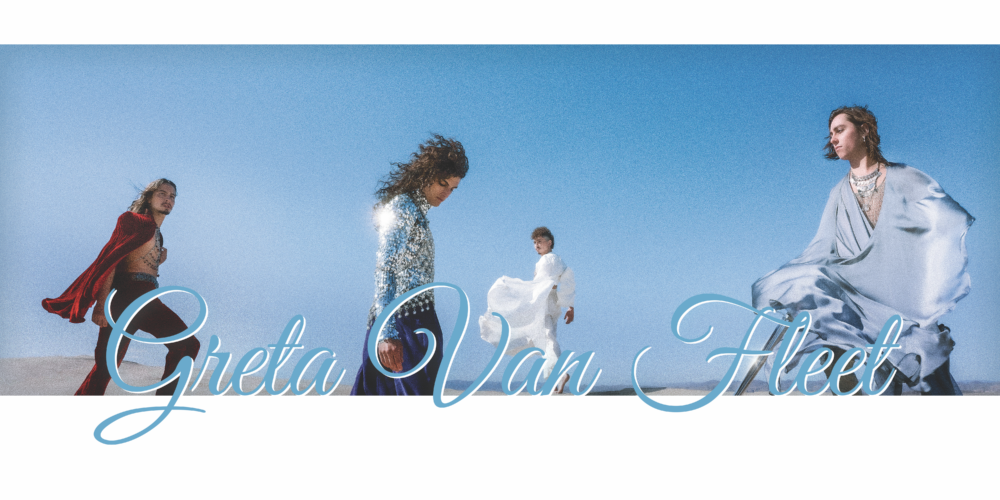
Wagner: The easiest way to describe the album is to break it down into two parts. Sonically, we covered a little bit of that. We really wanted to go back to our roots, so to speak. We wanted to go back to those early days and harness what got us into rock & roll and music in general. We tried to capture that sound, which involves recording live in a room, and creating a feeling in a song by playing it, not just adding all these little effects. We wanted to emotionally deliver that in performance. And thematically, we’ve spent the past few albums in the last few years creating a world in which we live in the Greta Van Fleet universe, expanding on these concepts and themes we’ve talked about over the last few years.
For instance, The Battle at Gardens Gate was almost a sequel to the first in a way, where the first album laid some groundwork and The Battle at Gardens Gate started introducing figures and characters and landscapes. With this current album we wanted to represent the dichotomy of all of it—the fantasy and reality, the love and hate, and just play with the dichotomies of these wide ends of the spectrum and everything in between.
MC: What about your lyrics?
Wagner: I can’t always speak for all of the lyricism, because we like to leave things up to interpretation, if you will. And I think that’s a beautiful thing. I love when I can hear a piece of work and I can have my own interpretation of it and can discuss with someone else their own interpretation of a song. That really gets things going. But, loosely, we wanted to capture this incredible dichotomy that’s relatable to the world we live in.
MC: So you have those kinds of personal conversations with fans where, in addition to, perhaps, comments on your drumming or guitar solos, they approach you to discuss the lyrical content of songs?
Wagner: Absolutely. Right after the first few singles had been released. Just walking around towns and meeting certain people, they immediately gravitated to those types of conversations. I found it incredibly endearing as an artist that it goes beyond just the surface of what they’re hearing. And in a day and age where I feel like our ability to focus is just diminished quite a little bit, that means a lot. Shorter songs seem more stomach-able and record labels are pushing for that surface-level two–minute song. So, it’s really cool to have these in-depth conversations with fans and what the songs mean to them. And then they ask what they mean to us. The lyrical content tends to take on its own meaning. Sometimes I’m shocked to hear their interpretations, where I have to step back and say, wow, I never even thought of things that way. But it totally makes sense and is not that far off from the main idea.
MC: You’re currently on tour. How do you write on the road and find the time to do it?
Wagner: So, the one fun thing about us is we never stop writing, ever! And it’s a blessing, because we have endless ideas and it comes from all four corners of this band. We basically take every opportunity we have with instruments because there is often limited time when you’re always traveling.
On show days we have a room that is dedicated to creativity, warm-ups and rehearsals. It’s filled with every instrument we’d need. On a typical show day we show up and do sound check. After that we’ve got about six hours before a show. So, we’ll find that room and get ourselves grounded—not even playing fully fledged ideas, but just loose ideas we’ll come back to at another time. We never block off time in our schedule for writing. It just all comes naturally in various different places.
MC: What are you currently listening to, and what bands, in your opinion and besides you guys, are carrying that rock & roll torch?
Wagner: That’s a fantastic question. Our music tastes are so eclectic and vast that it’s shocking to people. They think we’re just a rock & roll band and assume that’s all we listen to. But we’re really all over the place. We’re constantly trying to seek out older and more independent acts, because a lot of it was just lost in time. Personally I’m a massive folk listener. There are a couple artists I’ve been listening to lately. One of them is Laura Marling. She just released an album this year. I’ve always been a Fleet Foxes fan and they continue to release a lot of music.
More in the rock & roll vein, there’s this band out of Detroit called Mac Saturn, and it’s cool because their upbringing shares a lot of parallels with ours. They’re doing their first album at the same studio in Royal Oak, Michigan with the same crew and people. And that’s how we met them, through the same producers and people who got us running. They’re awesome guys and their music is incredible. And they have this amazing stage presence, which I think is an incredible art in itself.
You hear a lot of music, and if you’re hooked on the music it’s great. But, when their show blows your mind, then that’s just something super special. But them, First Aid Kit and Rival Sons all are contenders for holding that flag for the rock & roll march. Rock & roll is very far from dead and diminished. It’s ever present and riding its own groove in the shadows at the moment. A lot of these bands are able to tour the world and sell out theaters and arenas. It’s incredible to see and it speaks for itself. It’s very much alive and well.
MC: It’s very nice to hear someone like you in your position saying this, because there are a lot of naysayers out there. What you say is hopeful.
Wagner: Well, it’s nice to hear from someone like you, as well. You do kinda feel like you’re in your own universe or niche, if you will. It almost seems like a rock & roll fanbase requires a slightly higher attention span because the music is much more in depth. You’re not spoon fed, so to speak. We live in this world where we’re not always everywhere, but we are at the same time.
MC: You must have a very special relationship with your record label that gives you the freedom to create as you have?
Wagner: Absolutely. And, historically, I’m talking 40 or 50 years ago, there’ve been nightmare stories of rock & roll bands and their labels. It’s always been a tricky dynamic between the industry and the musicians themselves. So, naturally, as we were exploring and ready to take that next step years and years ago, we all had a bit of hesitation with record labels. We didn’t want to sacrifice all of our creative control. That was something that terrified us because we wouldn’t be who we are without our creative control. But, fortunately, we’ve been blessed with a good relationship with our record label and they have been incredibly supportive.
They’ve shown up to the studio when we’re recording. One terrifying but comforting example of that was when we were recording Battle of Gardens Gate they had the record label come out before the songs were finished. We played the first six songs or so. And one of them, “The Weight of Dreams,” was nine-plus minutes long, with guitar solos that go on forever. And, to us, it’s this expression of energy and it captures our live essence. And [the label rep) sat down in a chair and said, “That is fantastic! That’s rock & roll!” And we were thinking hopefully they’re not coming in expecting us to have 2:45-minute songs. We do have a couple shorter songs. We try to provide a little bit of all of it. But, yeah, it is quite a blessing to have a relationship with our label to maintain creative control to pursue our passion in writing.
MC: You’ve been a consistent entity as a band since 2012, survived a pandemic, and are now picking up momentum with a current tour. What are your secrets for making it all work?
Wagner: That’s a fantastic question. I think what keeps us going is the ability to travel to so many different demographics and fan groups across the globe, and meet so many different types of people. And they all share the same love for what we do. We feel their energy and we take that and put it back out into the world. It goes so much further than people think. In a world of darkness, criticism, technology and social networking it’s really amazing to get out in person and play these shows for real people.
But, also, it took a few years to kind of get used to it. It essentially went from a very home-based lifestyle—in high school with our regimens and routine—to traveling the world and having zero schedule. All of a sudden you’re thrown into a lot of situations where you had to grow up a lot quicker than you thought. It’s a very different lifestyle, especially with eyes on you at all times and anxiety is very high most of the time. But after a few years of doing it it started to become all that we knew.
MC: What was the process to adjust?
Wagner: You just become accustomed to being on the road. It’s also about being adaptable and being able to listen to what you need at all times. It’s okay to be a little selfish on the road, because you have to take care of yourself. I need to go to bed at this time. I might not wanna stay up and hang out with the other people who are doing what they need at the moment. So, it’s a lot about listening to what you need and there’s a lot of trust involved, too. At the end of the day I am very happy to be out on tour. I live for the chaos and I love it!
MC: Live for the chaos. That sounds like a song title (laughs)!
Wagner: It might be. I liked the way that came out.
MC: What regions around the world seem to really respond to your band?
Wagner: It’s interesting to learn, as you’re traveling the world and doing shows, there are a lot of different countries that share certain genres of music as their favorites. There was the whole British Invasion thing in London and the U.K. And they’ve always liked rock & roll. So, it wasn’t surprising that the first time we went over there we did decently well.
But there were some interesting countries that seemed random at the time, but make sense, like Italy. We’d go over to Europe and do these month-long tours and it was always Italy where we were able to seek out much larger venues than some other countries. South America is another one. They love music, in general, and it doesn’t have to be just rock & roll. They just love live music. We’ve done a bunch of Lollapaloozas down there and the fans will follow you to the gates sometimes at airports. It’s crazy, almost like Beatlemania down there.
MC: Is there anything else we haven’t covered?
Wagner: We’re just very thankful for the support we’ve gotten for the new record. We were at a vulnerable state in recording it. And it’s a very personal record for us. So, thank you to everyone that’s taken it under their wing and to dive into the lyricism and given it so much life. But, also keep an eye out for what’s next because we’re constantly writing. It almost seems like we’re a year ahead of everyone else in the world.
Contact [email protected]
Quick Facts
•Kyle Hauck was the original drummer for GVF from 2012-2013. He also came up with their name.
•GVF has been nominated three times for a Grammy Award.
•GVF won a Grammy Award in 2019 for the EP From the Fires.
•Their latest album Starcatcher debuted at No. 8 on the Billboard 200.
•To date, GVF has released two EPs and three studio albums.
